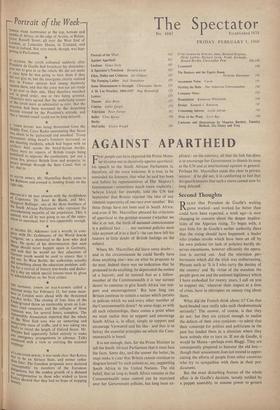AGAINST APARTHEID
r,E.W people can have expected the Prime Minis- Where Mr. Macmillan did leave some doubt— and in the circumstances he could hardly have done anything else—was on what he proposes to do-next. Indeed there was no indication that he proposed to do anything; he deprecated the notion of a boycott, and he insisted that as a fellow- member of the Commonwealth it is 'our earnest desire' to continue to give South Africa 'our sup- port and encouragement.' But how long can Britain continue to sustain a nation which persists in policies which we and every other member of the Commonwealth detest? At some stage, as with all such relationships, there comes a point when we must realise that to support and encourage South Africa is, in effect, simply to support and encourage Verwoerd and his like : and that is to betray the essential principles on which the-Com- monwealth is based.
It is not enough, then, for the Prime Minister to tell the South African Parliament that it must face the facts. Some day, and the sooner the better, he must make it clear that Britain cannot continue to disgrace herself by such actions as, say, supporting South Africa in the United Nations. The old belief, that so long as South Africa remains in the Commonwealth some control can be exercised over her Government policies, has long been ex-
ploded : on the contrary, all that the link has done is to encourage her Government to thumb its nose at the UN and at international opinion in general. Perhaps Mr. Macmillan made this clear in private session : if he did not, it is comforting to feel that his speech ensures that such a move cannot now be long delayed.










































 Previous page
Previous page